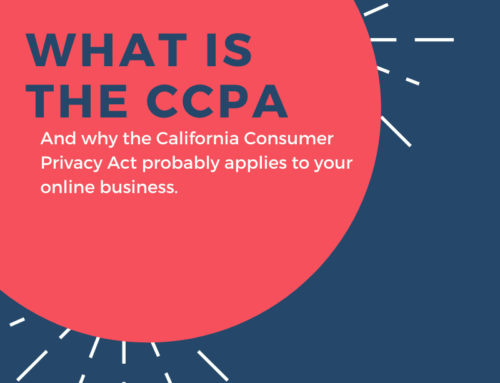
If you’ve been blogging for any time, you’ve probably come across people who have talked about incorporating yourself/your blog. Blogging as a business is not a new phenomenon. Making money from blogging, however, is becoming a reality for more and more people. As such, you may want to consider becoming a business. Why, you ask?
Having a formal business structure offers a host of financial and legal advantages, as wel as a level of professionalism. From being able to deduct legitimate expenses, building up Social Security credits, or even paying yourself a salary, a formal business structure can give your blogging a sense of legitimacy.
A formal business structure can also show brands and PR agencies that you are a real business not just a hobby. It also lends credibility to you and your information when approaching outsiders for sponsorships. In addition, most business structures allow you to shift liability to your business and away from you personally.
While each state has its own laws, there are several basic structures you can choose for your blogging business. The four main types of business structures are (1) sole proprietor, (2) corporation, (3) limited liability company or limited liability corporation (LLC), or (4) partnership. Each has its benefits and drawbacks. The best one, though, will depend on your specific circumstances.
Sole Proprietor
A sole proprietor is one person who owns a business. Up until the 1980s, this was the only way one person could own a business if they did not want to go through the process of becoming a corporation. Being a sole-proprietor does not require any type of special filing with your state.
In most cases you will not need to obtain a Federal Employer Identification Number (EIN), you will just use your social security number. Although, using an EIN does mean that you don’t have to give out your social security number. And it also make you look more professional to outside ventures. Some of the benefits include deducting legitimate business expenses, paying your kids, and using health care reimbursement arrangements.
The major drawbacks are that you may remain personally liable for business debts and other liabilities, as well as have limited tax benefits. In addition, in some states sole proprietors can not set up separate business bank accounts because the business is not separate from the individual. Many states, however, allow you to register as a DBA (Doing Business As) with your state business registration entity allowing you to set up a separate bank account.
Some localities may require you to have a business license if you operate out of your home, so you would need to check your local laws pertaining to home based businesses.
Corporation
A corporation is often seen as the complex type of business. It is governed by shareholders and operates under a set of By-Laws. Each state has its own set of laws that govern how a corporation is set up, usually beginning with filing Articles of Incorporation with the Secretary of State or other type of corporation commission. Some states provide blank forms and instructions on the agency website.
A corporation is owned by shareholders, which can be individuals, other corporations or even trusts. A corporation is a separate entity, completely separate from the shareholders and requires its own EIN, which is easily obtainable online via the IRS website, and a state tax ID.
In addition, you may have local (city or county) laws regulating your business as well. There are many cities across the country that regulate home-based businesses and you will need to be familiar with them to keep everything legal. While there are By-Laws on the internet which can be downloaded for free, I suggest avoiding these at all costs if you are not familiar with what they really mean or can do to your corporation.
Corporations also afford limited liability to the owners, so long as the organization complies with all the formalities such as record keeping, annual meetings, tax filings, state corporate filings and the like. Corporations also have a host of tax advantages such as deducting 100% of the cost of health and life insurance premiums paid for owners and employees as well as not being subject to Social Security, Medicare and Workers Compensation taxes. Your tax advisor can counsel you on these.
There are various drawbacks to be considered. One is the significant paper trail that must be created to comply with all the state corporation laws. Since a corporation is governed by a board of directors, you are not the sole decision maker and thus may not be able to pursue opportunities that are to you benefit but not necessarily a benefit for the corporation.
In addition, Corporations must file their own tax returns as well as quarterly information filings, if required. Also, keep in mind that if the corporation is seeking credit the creditor may require one or all of the shareholders to personally guarantee the repayment of the debt. Corporations also have annual filing requirements they must meet for their state to remain in good standing.
Limited Liability Company or Limited Liability Corporation (LLC)
Depending on your state, this newest form of business entity may be called a Limited Liability Company or Limited Liability Corporation (LLC). Each state has a separate set of law governing how to form your LLC, and all states now allow single member LLCs. If you live in a community or marital property state, you will need to know about the impacts of community property on your LLC ownership.
In general, an LLC is a hybrid organization, a cross between a corporation and a limited partnership. The members own the LLC. An LLC is formed by filing Articles of Organization with the appropriate state agency (often the Secretary of State or Corporation Commission). Most states have blank forms and instructions available on the agency website. Once finalized, the LLC obtains an EIN as well as a state tax ID, if required by your state law.
LLC can be taxed as a partnership, sole proprietor (if a single-member LLC) or an S-Corporation. If, though, for some reason the members want to be taxed as a C-corporation they can file the appropriate Form 8832 with the IRS. To determine which taxing entity is best for you, consult with your accountant or tax-attorney. The LLC is a tax pass-through entity and thus does not pay taxes itself. Instead, the members of the LLC are distributed the income based on their ownership and report the income on their individual tax return.
With an LLC, there are few rules that need to be followed to keep your organization in compliance. If you are a multi-member (2 or more) LLC, you should have an Operating Agreement that sets forth all the rules of your organization. It is similar to the By-Laws of a Corporation and governs how the LLC will operate. There are Operating Agreement forms circulating on the internet, which I counsel to avoid. Boilerplate forms may not be right for you and if you are not aware what they really mean they could create more problems for you at a time when that’s the last thing you need.
The advantages of the LLC are that there are no annual meetings needed and there is limited personal liability for members. Also, members do not have to pay ‘cash’ to become members. Membership can be granted based on any criteria and ownership can be split any way regardless of the monetary contributions made. The LLC can deduct legitimate business expenses and members can deduct health care expenses based on their pro-rata share of profits.
In addition, an LLC can be managed by its members or by a manager or managers. You have to decide this ahead of time, and you can’t switch between the two freely. However, as the organization grows and needs to bring in a professional to run it, the LLC can change its structure to allow for this growth.
There are some disadvantages to operating as an LLC. These include having to comply with state and federal filing requirements, if your state treats your LLC as a corporation you may need to file state corporate taxes, and recently many states have begun to require LLCs to pay annual franchise taxes. A franchise tax is a way for cash-strapped states to get more money from businesses simply because they do business in the state. Additionally, if your LLC does not have sufficient financial history, the members may be personally liable for the debts of the business.
Partnership
A partnership is an organization whereby two or more people or organizations come together to form a business. A partnership is an unincorporated business, although your state may have adopted partnership laws governing how they are created and operate. The organization is governed by a Partnership Agreement which lays out all the details of how the organization is run and how profits and liabilities are split.
Most partnerships are defaulted to a General Partnership where all parties involved have unlimited liability personally for the debts, obligations, unlawful acts and misdeeds of any partner or employee. If you establish yourself as a Limited Partnership you will need a General partner who assumes unlimited liability for the business and at least one limited partner.
Partners are not employees and distribute all profits to the partners. The organization does not file its own tax return. A partnership is required to obtain an EIN and comply with any state tax ID requirements as well. If you are not using your names as your company name you may likely need to register your business name with your state.
The pros of a partnership are that the financial burden is shared and it’s relatively easy to form. In addition, the work load can be divided in any manner the partners decide. The organization can operate without formal compliance with state regulations (at the time of this writing no state regulates bloggers). And, the partnership can continue even if one person decides to leave if there are at least 2 partners remaining.
The drawbacks of a partnership are that you may have unlimited liability for things you didn’t do. Furthermore, if you do not think through the Partnership Agreement, you may end up having to rely on the court to help you sort out the situation. Or worse yet, having to give up a business you created. Conflict is inevitable in every relationship. If you don’t preplan for those times your company can be in jeopardy. Also, there may be limitations on the transfer of ownership.
Summary
Choosing the type of business organization depends on many factors. While many may suggest becoming an LLC, you should evaluate your specific circumstances to determine if that is best for you. Seven states (Alabama, California, Kentucky, New York, Pennsylvania, Tennessee, and Texas) levy franchise tax on LLC which may make this type of entity cost prohibitive. In addition, there are some states that require annual filing fees that must be factored into the cost of operating your business. Publication fees may also be significant, depending on where you live.
Operating your blog as a business, regardless of which type of entity you choose requires that you keep your business dealings separate from your personal dealings. Funds should be kept separate, payments made from your business account and purchases made using business funds or separate credit card. Even as a sole proprietor you want to do everything you can to legitimize your business and make it separate from you. You do not have to have an elaborate accounting process or fancy software or separate phone line or anything like that. What you do need is good record keeping. Your accountant will thank you at tax time – and you will be glad you took the time along the way.




I love the LLC for small businesses. I think it’s the ideal form due to its flexibility and minimal requirements. One disadvantage I think you should mention, though, is that while corporations, sole proprietorships, and partnerships are all structures with a long history, the LLC is relatively new and is purely a creation of state law. As a result, the rules tend to vary among states. This can make things a bit confusing for a new business owner, especially if they try to operate in more than one state.
Thanks so much for this. I love the idea of forming an LLC, but I checked my state and they require and annual fee of $800! This is a bit steep for someone who is just starting out! I’d be happy if I made $800 this year 🙂
I assume it is possible to change from sole proprietor to and LLC at a later date. Is that correct?
Thanks again. I’m really happy you are writing this series!!
Stacy,
Yes, some states are very expensive for small businesses to form any type of entity. With that you’re left with being a sole proprietor which is a step toward establishing your business as separate from your personal life. You can change from a sole proprietor to an LLC at any time. There will be some additional paperwork, especially if you have a tax ID as a sole proprietor. You’ll need to get a new one as an LLC and that would mean updating any affiliates or businesses with your new ID number. Nothing overwhelming, just a little more work.
I appreciate your kind words and gratitude about the series. I’m glad to help.
~ Sara
Thanks Sara!
Sara, thanks for this blog! There’s a ton of links out there for “starting a blog”, but these cover basic process, and don’t address legal or tax issues / implications.
My question is: I started a blog as a sole proprietor and want to convert to an LLC, what category is appropriate for a blog business that may also publish ebooks(not print)? My state’s standard Articles of Organization form allows non-descript text like “The purpose of the limited liability company is to engage in any lawful act or activity for which a limited liability company may be formed under the x-StateName-x Limited Liability Company Act.” But isn’t there a more established description for blogs? I didn’t think “blog” would be understood in the official lexicon.
[…] What Type of Business Should I Form for […]
[…] more information on business options for your blog, read What Type of Business Should I Form? by Sara Hawkins, […]
[…] more information on business options for your blog, read What Type of Business Should I Form? by Sara Hawkins, […]
[…] an excellent additional explanation, check out attorney Sara F. Hawkins‘ blog on business […]
Very impressive and informative article. Thanks for sharing.